Angelica archangelica – Archangelica officinalis L.
Perennial herb up to 2 m, families zontichnыh (Umbelliferae). Angelica grows in the European part of Russia and the Caucasus. Medical raw material are the rhizome and roots of angelica.

Angelica drug – chemical composition
The roots and rhizomes of angelica contain essential oil, which includes sesquiterpene compounds, pinene, felandren, gidrooksipentadekanovaya and methylbutyric acid, umbelliprenin, ksantotoksin, ostol, ostenol, bergapten, imperatorin, angelicii, arkhangyelitsin. Besides, angelica root found in malic acid and angelic, phytosterols, tannins.
Angelica archangelica – Pharmacological properties
Galenic formulations have anti angelica, antispasmodic, diuretic and diaphoretic action. In animal experiments found some sedation plants. The most active substance is an essential oil, which, entering the digestive tract, It has a slight irritant effect on the gastric mucosa, thereby causing increase in gastric secretion, and gives antispasmodic effect. Sucking, essential oil is partially allocated bronchial glands, increasing their secretion and exerting bactericidal and antispasmodic effect on the respiratory tract. The presence of organic acids in Diaghilev explained diuretic and diaphoretic effect plants.
Angelica archangelica – medical applications
Angelica root belongs to the most versatile on the pharmacological activity of medicinal plant species. Herbal medicines plants increase bile, gastric and pancreatic juice, and also increase the formation of mucus in the upper airways. Besides, they increase sweating and diuresis.
There are some clinical observations, pointing to the possibility of increasing uterine bleeding when taking drugs angelica. Angelica root, possessing inflammatory properties, effective flatulence, and thanks to the antimicrobial properties inhibit fermentation in the gut. Angelica root extract provides a soothing effect, Similar actions of drugs of valerian root.
Typically, drugs prescribed for Angelica functional disorders of the gastrointestinal tract, related to a decrease of gastric juice, glycosaminoglycans bile and pancreatic juice, as well as violations of motor function of the intestine (in particular, for the relief of intestinal colic).
The drugs used in the angelica biliary dyskinesia, as a result of the treatment of patients improved appetite, disappear a feeling of fullness in the epigastric region, belching, a tendency to nausea and vomiting, stomach ache. Good results were observed when prescribing for patients with angelica vegetative neurosis.
Angelica used as an expectorant and anti-inflammatory agent for laryngitis, ʙronxitax, pneumonia own in the form of infusion or decoction and as part of anti-, expectorants fees. Effective use of herbal forms angelica at gipatsidnyh gastritis, duodenitis, infectious nonspecific colitis, in conjunction with other herbs of similar actions in the form of complex medical fees and teas. Contraindications and side effects in the appointment of angelica were observed.
Angelica archangelica – Dosage Forms, Dosing and Administration
A decoction of the roots of Angelica archangelica: 10 g (3 tablespoons) raw material is placed in an enamel bowl, Pour 200 ml (1 glass) hot boiled water, capped and heated in boiling water (in a water bath) 30 m, cooled at room temperature 10 m, filter. The volume of the resulting broth bring boiled water to 200 ml. The prepared broth is stored in a cool place no more 2 d.
Take hot by 1/2 cup 2-3 times daily after meals as an antispasmodic, stimulating the appetite, expectorant and diaphoretic.
Roots store in a cool dry place.
